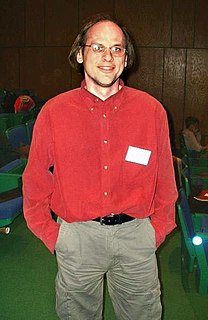A Quote by Richard Dawkins
A good scientific theory is one which is falsifiable, which has not been falsified.
Quote Topics
Related Quotes
Well, it [evolution] is a theory, it is a scientific theory only, and it has in recent years been challenged in the world of science and is not yet believed in the scientific community to be as infallible as it once was believed. But if it was going to be taught in the schools, then I think that also the biblical theory of creation, which is not a theory but the biblical story of creation, should also be taught.
One of the greatest accomplishments of Western civilization is the development of the scientific method and the scientific disposition, which entail the development of falsifiable hypotheses about the world and the unwillingness to take unverified and untheorized claims about the world as truth, simply because someone states that they are true.
The problem with intelligent-design theory, is not that it is false but that it is not falsifiable. Not being susceptible to contradicting evidence, it is not a testable hypothesis. Hence it is not a scientific but a creedal tenet - a matter of faith, unsuited to a public school's science curriculum.
One problem of the String Theory is that it's kind of a theory which can explain what the problems are, but the problems are such that you can't even pin it down and say this is exactly what it predicts, so lets go out and test it. So, it's not even capable of being wrong, or being falsified, or being showed to be wrong.
It is easy to obtain confirmations, or verifications, for nearly every theory-if we look for confirmations. Confirmations should count only if they are the result of risky predictions... A theory which is not refutable by any conceivable event is non-scientific. Irrefutability is not a virtue of a theory (as people often think) but a vice. Every genuine test of a theory is an attempt to falsify it, or refute it.
Under my definition, a scientific theory is a proposed explanation which focuses or points to physical, observable data and logical inferences. There are many things throughout the history of science which we now think to be incorrect which nonetheless would fit that which would fit that definition. Yes, astrology is in fact one.
We shall see that the mathematical treatment of the subject [of electricity] has been greatly developed by writers who express themselves in terms of the 'Two Fluids' theory. Their results, however, have been deduced entirely from data which can be proved by experiment, and which must therefore be true, whether we adopt the theory of two fluids or not. The experimental verification of the mathematical results therefore is no evidence for or against the peculiar doctrines of this theory.
The theory of free speech, that truth is so much larger and stranger and more many-sided than we know of, that it is very much better at all costs to hear everyone's account of it, is a theory which has been justified on the whole by experiment, but which remains a very daring and even a very surprising theory. It is really one of the great discoveries of the modern time.



































